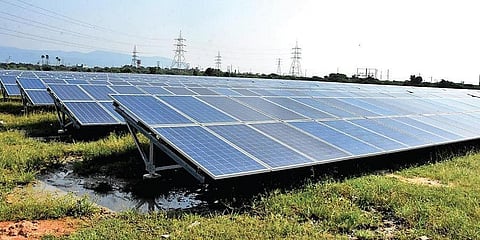

BENGALURU: While the Karnataka State Government is promoting green energy, little or no thought has been given to handling solar panel waste. Now, used solar panels are dumped in landfills and are treated as regular waste. Recyclers too hesitate to recycle the panels, with the production cost of new panels coming down drastically over the last few years. Environmentalists point out that solar module waste is not covered under the current solid waste management rules policies, which may lead to big environmental concerns later.
“Bengaluru does not have a separate centre to recycle or dispose of solar waste,” said Vinod, owner of V1 Energy, a solar energy equipment supplier. If there is less waste, it is usually dumped with regular waste, if there the numbers are big, they are sent to scrap centres. Vinod said he does not prefer recycling because it is expensive and manufacturing new panels is way cheaper.
The draft Karnataka Renewable Energy Policy for the next five years, brought out by the Karnataka Renewable Energy Development Limited (KREDL), does not have any mention of disposing of solar panel waste. What is worrying is that this waste could mount to enormous levels, because Karnataka is among the leading states in the renewable energy (RE) sector.
“The panels installed in the early 2000s are on the verge of expiry and will be discarded in a few years. This will generate large amounts of waste, and if the country does not come up with a waste management policy at the earliest, we will not be able to handle the waste at the eleventh hour,” said Ayush Shukla, manager, National Solar Energy Federation of India (NSEFI).
An environment officer from the Karnataka State Pollution Control Board admitted that there is a need for a policy that should be chalked out by the Centre. Best practices from other countries should be adopted while formulating the policy, he added.
A report by the Bridge To India (BTI), a renewable energy consulting firm, stated that the volume of photovoltaic (PV) panel waste in the country is estimated to grow to 2,00,000 tonnes by 2030 and to around 1.8 million tonnes by 2050.
Most solar recycling plants only remove silver and copper from the cells. They burn the glass and plastic casings in cement ovens to recycle them. Incineration releases toxins and greenhouse gases into the environment. “Since the process is expensive and time-consuming, companies find it better to dispose of the dead panels in landfills or export them to third-world countries,” said Poorna Khanna, an environmentalist.
Studies have shown that heavy metals in solar panels, including lead and cadmium, can contaminate groundwater and affect plant life. Records also show that these metals can cause harm to human health, she said.